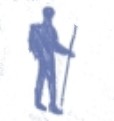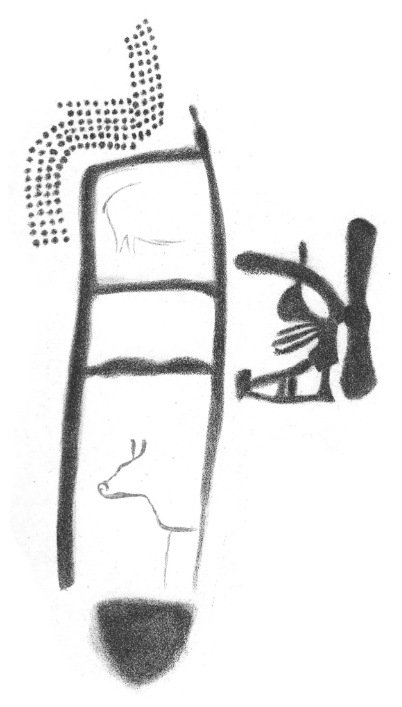Published in Slightly Foxed
September 2024
We are observing a group of people trying to find a log. The log is not where they left it. They have been away for some time. Now it is not where it was, and they are perturbed. It is, we gather, a long log. They need it in order to cross a marsh. Finally one of them – he is called Lok – has the bright idea of finding another log, and putting it where the old one was. His companions are deeply impressed by this. A new log is located and moved by communal effort. Now they can cross the marsh to get to where they want to go. They take it in turns to walk along the log, but one of them, an old man, falls into the water. They pull him out, but he is wet and cold, and starts shivering. This seems to trouble them much more than we might expect. We infer that being cold represents a mortal threat.
What on earth is going on?
I read the first pages of William Golding’s The Inheritors with confusion and frustration. Who begins a book with a search for a missing log? Why do these people seem so… slow? Why are apparently simple tasks so difficult for them?
But Golding’s second novel is a very unusual book. To start with, these are not people. Or at least, they are not our people. The novel is written (though that’s the wrong word) from the viewpoint of a small band of Neanderthals, possibly the last of their kind, as they return to their foraging grounds in a mountainous, forested region to encounter a species they’ve not seen before: Homo sapiens, us. The Neanderthals call them the ‘new people’. The new people are more advanced, at least in terms of tools and weapons, and the encounter – this is only a spoiler if you’ve never wondered why Neanderthals are not around today – does not go well for Lok and his tribe. By the end of the book, we have borne witness to human-on-human extinction.
Golding started work on this novel in the autumn of 1954, and wrote the first draft over several months of creative fervour. It was published in 1955, only a year after publication of his first novel, Lord of the Flies, and 99 years after fossils from a previously unknown species were discovered in a quarry in Germany’s Neander Valley. In the century between those events, public perception of what archaeologists termed Homo neanderthalensis had shifted from bestial, ape-like brutes to something more… well, human. And in the decades since his novel, they have become more human still: scientists recognise today that Neanderthals had what we might call ‘culture’, that they wore clothes, knapped flints and made fires, and were certainly as intelligent – though perhaps in a different way – as our behaviourally modern ancestors with whom they co-existed. Their brains, famously, were bigger. They may even have made art, though this is contentious.
Presumably Golding did not know these things, and vestiges of the ape still cling to his creations. A great deal is made of their hair, which seems to cover most of their bodies; they go around naked, and craft no tools, jewellery or containers. But they do have language, albeit a simple one, and they ceremonially bury their dead. They also have something like religion – and they share ‘pictures’.
These are not artworks, but mental images – descriptions, visions and memories – that can be passed from person to person in order to spread ideas. Though it is never made clear, sometimes it seems like a form of telepathy. The system does not always work; occasionally a picture fails. But through our shared glimpses, we see what they see. Through this and other startling tricks, Golding plunges the reader into a different consciousness.
The perspective he makes the reader inhabit blends estrangement with familiarity. The narrative is in the third person, so we are not inside the Neanderthals’ heads, but we are given no more information than what is available to them. When Lok first sees the new people, he thinks their faces are made of bone; the reader shares his confusion and horror until Lok realises (and we realise) that the whiteness is their skin. The initial frustration I felt is in fact the book’s genius. There are lengthy sections of prose where I found it almost impossible to work out what was going on, and comprehension only dawned on a second reading. The first time this happened was in this passage, when Lok and one of the new people come face to face across a river:
The man turned sideways in the bushes and looked at Lok along his shoulder … A stick rose upright and there was a lump of bone in the middle. The stick began to grow shorter at both ends. Then it shot out to full length again.
The dead tree by Lok’s ear acquired a voice.‘Clop!’
His ears twitched and he turned to the tree. By his face there had grown a twig … The leaves on the twig were red feathers and reminded him of goose. He was lost in a generalised astonishment and excitement.
This generalised astonishment is what the reader feels as well – we are perplexed by what we are being made to see. But when our understanding clicks, it is like a magic trick. If you didn’t get the description above, try reading it again, with the advantage of what you know about our Stone Age ancestors; what weapons they might have had, and how those weapons worked. Such moments of illumination have the effect of opening up a gulf between the protagonists and us – we go from being as confused as Lok to knowing more than Lok. Suddenly we are in the position of looking down on him, made superior by our knowledge, and the separation almost hurts. We have become complicit in the world view of the invaders.
But Golding keeps deftly guiding us back to the other side of the divide, where everything is strange again. In the book’s second half, the new people’s actions grow increasingly obscure. In a ceremonial debauch they get drunk on fermented honey (this, at least, we understand) and do violent things by firelight. A semi-humanoid stag appears – a vision, or is he real? There is screaming, sex and blood, and the scene feels like a nightmare as observed by a toddler, incomprehensible and frighteningly out of control. Again we find ourselves unmoored, disassociated from our species. They are the weird ones again. We are bounced from world to world.
Because they were written back-to-back, it makes sense that The Inheritors has similarities to Lord of the Flies, the book that made Golding’s name. They are both about conflict between tribes in a world where nature is vast and abundant, and both explore themes of dominance, savagery and civilisation. But reading this novel also made me think of Golding’s contribution to the 1970s, when he proposed the term ‘Gaia hypothesis’ to his scientist friend James Lovelock, after the Greek goddess who represents the Earth. Though derided at the time, Lovelock’s theory – that the planet acts as a single living organism – has now gained widespread acceptance. The tribe of Lok would certainly have understood the idea. To the Neanderthals in the novel, everything is alive: the rocks, the wind, the water (of which they are deeply afraid). They are born from the earth, and when they die they go back to the earth. They venerate a totem called Oa, a generative mother-goddess. The names even seem related: Oa and Gaia.
For me, the real mind-benders come in the last two chapters. Golding zooms out, and then zooms out again, twice flipping our perspective. First we observe our protagonist as if from a camera high above – no more himself, no more Lok, but just a strange red-haired ‘creature’. The reader becomes a scientist dispassionately recording his behaviour as he erratically roams about, alone and in apparent distress. We no longer have access to his thoughts. We no longer see his pictures. Then suddenly we are far away, on a boat sailing across a sea. We are with the new people now, who have names and narratives. They – we – are fleeing from the primitive darkness of the trees, heading to wide open lands where they can follow game. It turns out they were terrified of the ‘forest devils’ they encountered and were not attempting to invade but only passing through. The novel’s final chapter feels like the opening of a different book.
Which, of course, it is. That different book is us.
You can buy a copy of Slightly Foxed Issue 83 here


